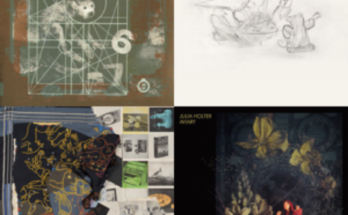Cake, in its edible form, is prepared in a formulaic manner. Yes, there are some strikingly innovative pastries that can be defined by the term-German chocolate, pineapple upside-down or virtually any wedding cake-but at the heart of it all is purely a little flour, some eggs, milk and of course, sugar. No one can deny the blissful simplicity of a frosty slice of chocolate cake.
“We don’t ever want to try and reinvent ourselves, because we have a decent sound. We’re a five-piece band with the same guitar, bass, drums and ‘trumpet.’ We play and come up with arrangements that fit each song … so yeah, we’ve just sort of maintained a consistency, and we just try to get better and better with the configuration we have,” states the Latin-tinged trumpet man Vincent Di Fiore, one of the band’s inherently stylized and basic elements.
To the Sacramento-based, post-alternative/funkedified deadpan poets, Cake, the band, embraces its simplicity, achieving complexity with a sort of instrumental minimalism. However, since their low-fi origins, represented by 1992’s Motorcade of Generosity, explosion into the airwaves in ’96 with the flat sarcasms of Fashion Nugget’s “I Will Survive” and “The Distance,” and subsequent self-proclaimed detachment from the grunge scene, critics and musicians alike have been slamming the pastry crusader’s sound as derivative and ideals contemptuous.
In a June 2004 MetroActive magazine interview with bass player Victor Krummenacher of Camper Van Beethoven -recently re-united influential/iconoclastic indie band of the ’80s-the bassist declared that Cake would not even exist if it weren’t for CVB’s existence.
“[Cracker guitarist] Johnny Hickman and I have this joke, the ‘Look what you have wrought’ joke, you know, when you have something that’s just obviously Camper-derived. Like, we played with Cake … God, it’s like they couldn’t have existed without us, and I hate them so. They’re just completely contemptuous of their audience-I just feel like John McCrea exudes that attitude. I don’t care if he reads this and sees me saying horrible things about him. I think he sucks. I think many things kind of suck these days. I don’t see people pushing the musical envelope very often.”
Ironically, CVB has actually been credited, or rather accused, of creating the very genre they claim to despise, iconoclastic indie-rock.
Nevertheless, take the lyrics from the immensely popular Gloria Gaynor cover, “I Will Survive,” “Well now go/Walk out the door/Just turn around/ Now, you’re not welcome anymore/ Weren’t you the one/ Who tried to break me with desire?/Did you think I’d crumple?/Did you think I’d lay down and die?” Frontman John McCrea didn’t write them of course, but Cake was cited as mocking the music biz with his smirky tone.
Thus, the band, at times, suffers this pigeonholed, artistic misunderstanding by various critics. McCrea’s deadpan sarcasm is labeled contemptuous toward the American public when it’s meant to be universally accessible social commentary. Di Fiore iterates, “We make commentary about rock and roll itself, and instead of getting on the bandwagon and saying ‘yee-haw’ and getting on with the big party of rock, maybe there are some things wrong with it. And you know we make that a part of the commentary. People think of rock itself as being iconoclastic, but really it’s just going along with the status quo. So maybe we’re called iconoclastic because of observations that we sometimes make about the rest of the rock and roll world.”
Despite misunderstood critics and angry predecessors, both Volcano Entertainment-produced albums, Fashion Nugget and Prolonging the Magic, achieved platinum status; the subsequent Comfort Eagle (Columbia) went gold. And with the release of their new album Pressure Chief, Cake has launched a 20-city headlining tour with British rockers Gomez. Almost exclusively stopping at college campuses, the band is indeed surviving the business. Di Fiore further exudes their iconoclastic style, “I think that maybe in Seattle once someone described us as quixotic, which I thought was a pretty good description. You know he’s someone who was attacking windmills with his spear.”
Sticking with those same ingredients, guitar, bass, drums and Di Fiore’s trumpet line, Pressure Chief is dynamically consistent. McCrea heightens his barren tone all too often on tracks suck as “No Phone” and “Wheels” but still manages to keep that smirk on his face. Being the first time the band has recorded in their own studio, an all-controlling freedom empowered each musician to contribute as they saw fit. “We engineered it ourselves, produced it ourselves and arranged it ourselves … it made some things a little bit more punchy and gritty. A lot of people say that this album reminds them a lot of our first record, Motorcade of Generosity because they’re both scrappy records. We kind of sound a little bit like a garage band that’s using a lot of tools at our disposal to make that garage band sound work,” states Di Fiore.
Cake stays true to their mantra in the face of the all-consuming cycle of the music industry and commercialism. Donning the home page of their Web site, a quote from the late Hunter S. Thompson reads, “The music business is a cruel and shallow money trench, a long plastic hallway where thieves and pimps run free, and good men die like dogs. There’s also a negative side.” Comparably, Di Fiore sums up the bands iconoclastic ideology, “Cake is a four-letter word with some phonetic oomph. It’s meant to be a verb; when food gets caked on your fingers or culture caked up on itself; the accumulation of wasteful physical matter, consumption, whether it be culture or material.” He continues, reflecting on the Thompson quote, “It’s an exciting, action-packed evil world of rock and roll … makes you feel like a G.I. Joe soldier amidst it all.”
Cake will appear Wednesday, April 20 at the Assembly Hall. Tickets are $26 and the show starts at 7pm with opening bands Robbers on High Street and Gomez.



